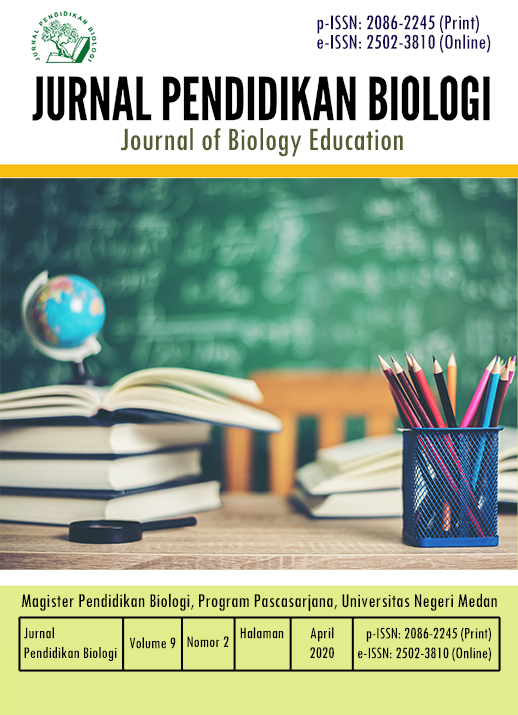Pengaruh Model Pembelajaran Kooperatif Tipe Make A Match Terhadap Hasil Belajar Siswa
DOI:
https://doi.org/10.24114/jpb.v9i2.19078Keywords:
Make a match, Student learning outcomes, Cooperative learningAbstract
The problem in this study is the low learning outcomes of class VII students of SMP Negeri 20 Kupang. This study aims to determine the effect of the Make A Match type of cooperative learning model on learning outcomes. The experimental research method used is the Posttest-Only Control Group Design. The population of class VII students was 253 students and the sample of class VIID and class VIIH was 54 students. Data collection using learning outcomes tests. Analyzed using t-test, assisted by SPSS For Windows version 23. Hypothesis test results obtained tcount 8,194> 2,00665 ttable at 0,000 significance or less than 0.05, indicating that there are differences in student learning outcomes between the control and experimental classes. It is shown by increasing students' understanding of the digestive system material, students look very enthusiastic in learning, have curiosity, and dare to express opinions during the learning process. Therefore, the Make A Match learning model has great potential in developing students' ideas on problem-solving in learning, as evidenced by the high percentage of student learning outcomes, namely C1 93.055%, C2 75.462%, and C3 73.765%.References
Rahmawati, E. (2015). Penerapan Model Pembelajaran Make a Match Untuk Meningkatkan Keaktifan Dan Prestasi Belajar Siswa Pada Mata Pelajaran Sosiologi Kelas XI Iis 2 Di SMA Negeri 2 Surakarta Pada Tahun Pelajaran 2014/2015. Sosialitas: Jurnal Ilmiah Pendidikan Sosiologi-Antropologi, 13743.
Febriana, A. (2011). Penerapan Model Pembelajaran Kooperatif Tipe Make A Match Untuk Meningkatkan Kualitas Pembelajaran Ips Siswa Kelas V Sdn Kalibanteng Kidul 01 Kota Semarang (Application of Cooperative Learning Model Type Make A Match to Enhance Quality of Learning Social. Jurnal Kreatif: Jurnal Kependidikan Dasar, 1(2).
Miftahul, H. (2014). Model-model Pengajaran dan pembelajaran. Yogyakarta: Pustaka Pelajar.
Huss, J. A. (2006). Gifted education and cooperative learning: A miss or a match?. Gifted child today, 29(4), 19-23.
Nadliyah, A., Taufiq, M., Hidayat, M. T., & Kasiyun, S. (2019). Pengaruh Model Pembelajaran Kooperatif Tipe Make A Match Terhadap Hasil Belajar Siswa pada Mata Pelajaran IPA. Natural Science Education Research, 2(1), 33-39.
Naimnule, L., Oetpah, V., & Sila, V. U. R. (2016). Peningkatan Aktivitas Dan Hasil Belajar Kognitif Siswa Melalui Penerapan Model Pembelajaran Think Talk Write (Ttw) Di Smuk. Jurnal Pendidikan: Teori, Penelitian, dan Pengembangan, 1(10), 2050-2053.
Aliputri, D. H. (2018). Penerapan Model Pembelajaran Kooperatif Tipe Make A Match Berbantuan Kartu Bergambar Untuk Meningkatkan Hasil Belajar Siswa. Jurnal Bidang Pendidikan Dasar, 2(1A), 70-77.
Prastowo, A. (2015). Panduan Kreatif Membuat Bahan Ajar Inovatif. Yogyakarta: Diva Press.
Shofiya, K. (2018). Pengembangan Tujuan Pembelajaran PAI Aspek Kognitif Dalam Teori
Anderson, L. W. dan Krathwohl, D.R. Jurnal Al Ghazali. 1(2)
Sugiyono. (2012). Metode penelitian Kuantitatif Kualitatif dan R&D. Bandung: Alfabeta.
Sundari, H. (2015). Model-model pembelajaran dan pemerolehan bahasa kedua/asing. Jurnal Pujangga, 1(2), 106-117.
Suparta, D. G., Lasmawan, M. P. P. I. W., & Marhaeni, M. P. A. N. (2015). Pengaruh model pembelajaran kooperatif teknik make a match terhadap motivasi belajar dan hasil belajar IPS. e- Journal Program Pascasarjana Universitas Pendidikan Ganesha, 5:1-12
Downloads
Published
Issue
Section
License
Copyright (c) 2020 Jurnal Pendidikan Biologi

This work is licensed under a Creative Commons Attribution 4.0 International License.
Copyright
Penyerahan naskah menyiratkan bahwa karya yang diserahkan belum pernah diterbitkan sebelumnya (kecuali sebagai bagian dari tesis, laporan, atau abstrak). Naskah tidak dipertimbangkan untuk publikasi di tempat lain. Penerbitannya telah disetujui oleh semua penulis bersama. Jika dan kapan naskah diterima untuk publikasi, penulis masih memegang hak cipta dan mempertahankan hak penerbitan tanpa batasan. Penulis atau orang lain diperbolehkan untuk melipatgandakan artikel selama tidak untuk tujuan komersial. Untuk penemuan baru, penulis disarankan untuk mengelola patennya sebelum diterbitkan.
Open Access
Jurnal ini berkomitmen untuk membuka akses bebas yang tidak membebankan biaya kepada pembacanya atau lembaga mereka. Pembaca berhak membaca, mengunduh, menyalin, mendistribusikan, mencetak, mencari, atau menautkan ke teks lengkap artikel, selama tidak untuk tujuan komersial. Jenis lisensi adalah CC-BY-4.0.
Disclaimer
Tidak ada tanggung jawab yang dikenakan kepada Penerbit atau oleh editor untuk kesalahan dan/atau kerusakan pada naskah sebagai akibat dari pernyataan pencemaran nama baik atau dugaan pencemaran nama baik, pelanggaran hak kekayaan intelektual atau privasi, atau kewajiban produk, baik akibat kelalaian atau sebaliknya, atau dari penggunaan atau operasi ide, instruksi, prosedur, produk atau metode apa pun yang terkandung dalam materi di dalamnya.

